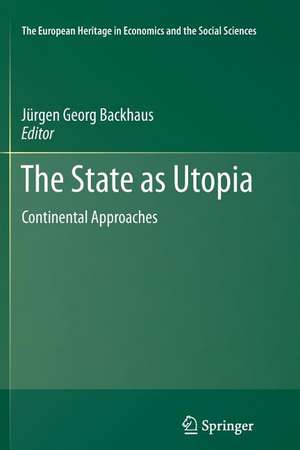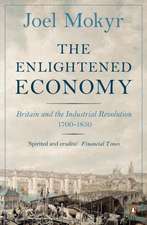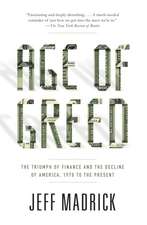The State as Utopia: Continental Approaches: The European Heritage in Economics and the Social Sciences, cartea 9
Editat de Jürgen Backhausen Limba Engleză Paperback – 31 ian 2013
| Toate formatele și edițiile | Preț | Express |
|---|---|---|
| Paperback (1) | 637.78 lei 6-8 săpt. | |
| Springer – 31 ian 2013 | 637.78 lei 6-8 săpt. | |
| Hardback (1) | 642.83 lei 6-8 săpt. | |
| Springer – 3 dec 2010 | 642.83 lei 6-8 săpt. |
Din seria The European Heritage in Economics and the Social Sciences
- 18%
 Preț: 954.62 lei
Preț: 954.62 lei - 15%
 Preț: 635.01 lei
Preț: 635.01 lei - 18%
 Preț: 1237.80 lei
Preț: 1237.80 lei - 18%
 Preț: 721.01 lei
Preț: 721.01 lei - 15%
 Preț: 631.86 lei
Preț: 631.86 lei - 15%
 Preț: 630.09 lei
Preț: 630.09 lei - 15%
 Preț: 630.75 lei
Preț: 630.75 lei - 15%
 Preț: 646.75 lei
Preț: 646.75 lei -
 Preț: 388.72 lei
Preț: 388.72 lei - 18%
 Preț: 784.61 lei
Preț: 784.61 lei - 18%
 Preț: 727.97 lei
Preț: 727.97 lei - 18%
 Preț: 947.04 lei
Preț: 947.04 lei - 18%
 Preț: 950.03 lei
Preț: 950.03 lei - 15%
 Preț: 641.85 lei
Preț: 641.85 lei - 15%
 Preț: 638.24 lei
Preț: 638.24 lei - 15%
 Preț: 636.63 lei
Preț: 636.63 lei - 15%
 Preț: 635.01 lei
Preț: 635.01 lei - 18%
 Preț: 1001.19 lei
Preț: 1001.19 lei - 15%
 Preț: 645.47 lei
Preț: 645.47 lei - 15%
 Preț: 639.25 lei
Preț: 639.25 lei - 15%
 Preț: 643.48 lei
Preț: 643.48 lei - 18%
 Preț: 952.09 lei
Preț: 952.09 lei - 18%
 Preț: 946.24 lei
Preț: 946.24 lei - 15%
 Preț: 641.03 lei
Preț: 641.03 lei
Preț: 637.78 lei
Preț vechi: 750.33 lei
-15% Nou
Puncte Express: 957
Preț estimativ în valută:
122.03€ • 127.43$ • 100.77£
122.03€ • 127.43$ • 100.77£
Carte tipărită la comandă
Livrare economică 15-29 aprilie
Preluare comenzi: 021 569.72.76
Specificații
ISBN-13: 9781461427766
ISBN-10: 1461427762
Pagini: 220
Ilustrații: X, 210 p.
Dimensiuni: 155 x 235 x 12 mm
Greutate: 0.35 kg
Ediția:2011
Editura: Springer
Colecția Springer
Seria The European Heritage in Economics and the Social Sciences
Locul publicării:New York, NY, United States
ISBN-10: 1461427762
Pagini: 220
Ilustrații: X, 210 p.
Dimensiuni: 155 x 235 x 12 mm
Greutate: 0.35 kg
Ediția:2011
Editura: Springer
Colecția Springer
Seria The European Heritage in Economics and the Social Sciences
Locul publicării:New York, NY, United States
Public țintă
ResearchCuprins
Introduction.- A Demand-Revealing Utopia.- Economic City-Planning and Environmental Proposals by Plato in the City of Atlantis and of the Laws.- Property in a Utopian State, Informed by Ideas of Pufendorf and Locke.- John Stuart Mill and the Utopian Tradition.- The State as Utopia: Some Thoughts on Theocracy.- Justi's Concrete Utopia.- The Kingdom of Ophir – a "Realistic Utopia".- Is Montaigne a Utopian?- Labour in Utopian Socialism.- Der Zukunftsstaat - Carl Ballod's Vision of a Leisure-oriented Socialism.- Developing Society According to Man's Development.- The Utopian Element in the Formation of Doctrines on the State in German Staatswissenschaften.- Utopia – Johann Peter Süßmilch and the Devine Order.- Eugen Dühring and Post-Utopian Socialism.
Textul de pe ultima copertă
This book examines utopias in classical political economy and is based on the papers presented by leading scholars at the 22nd Heilbronn Symposium in the Economics and the Social Sciences. The book focuses on the tension between the State and utopia (the State as utopia vs. utopia instead of a state). The contributors also study the question of whether seafaring and landlocked states visualize the commonwealth differently and develop different utopias, and it is concluded they do not. The volume therefore follows the refutation of the Schumpeterian Hypothesis that more concentrated industries stimulate innovation. Though the hypothesis is refuted it still remains important, the chapters argue, because it charts out an entire research program, serves as a benchmark of definite public and private sector boundaries, and defines the grammar of discourse for constitutional economic policy in OECD states.These themes are explored in detail through contributions by economists, philosophers, and social historians. The contributors examine utopias hitherto never or rarely reviewed in the English language, making this book of interest to students and scholars in economics, political science and the history of economic thought.
Caracteristici
Brings together an international collection of contributors from both academic and profession backgrounds Examines some utopias which are virtually unknown and/or have never been studied in English Uses the concept of utopia to test the Schumpeterian Hypothesis of Creative Destruction Includes supplementary material: sn.pub/extras













